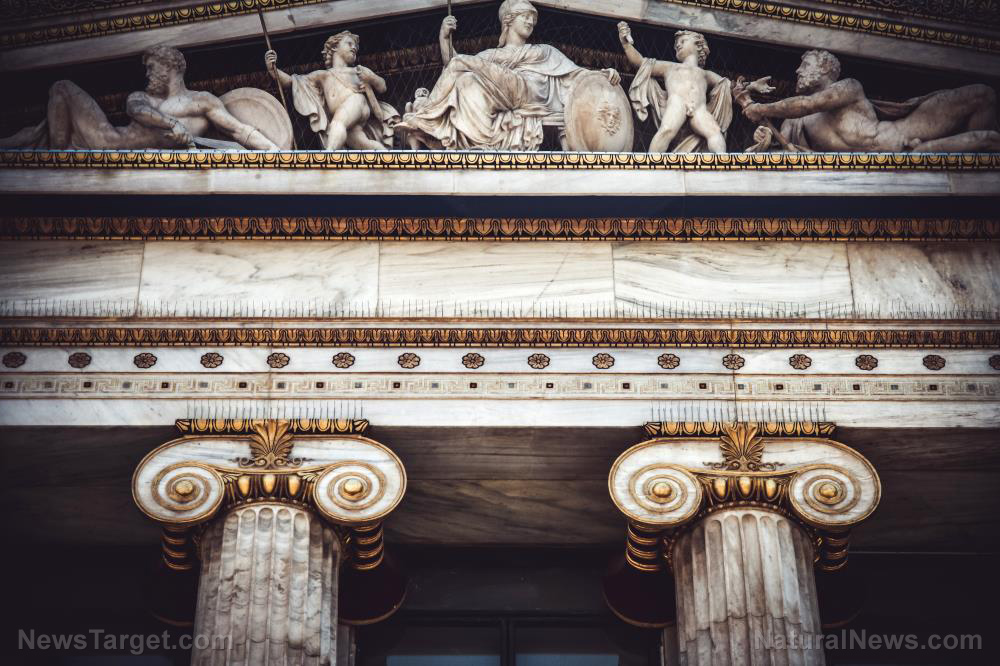The rise and fall of the Library of Alexandria: A legacy of knowledge lost to time
01/22/2025 / By Arsenio Toledo

- The Library of Alexandria, founded in the 3rd century B.C. under the Ptolemaic dynasty, was the ancient world’s largest repository of knowledge, housing hundreds of thousands of unique scrolls from diverse civilizations.
- Its decline began with the expulsion of foreign scholars in 145 B.C., followed by partial destruction during Julius Caesar’s siege in 48 B.C., and culminated in its final destruction during Roman sieges in the 3rd century A.D.
- The library’s loss erased countless lesser-known works, commentaries and texts, leaving an incalculable gap in the understanding of ancient thought and culture.
- Scholars lament the library’s destruction as a cultural catastrophe, emphasizing the irreplaceable loss of unique insights into antiquity.
- Today, the Library of Alexandria symbolizes humanity’s quest for knowledge and the enduring responsibility to safeguard intellectual heritage against time, conflict and neglect.
Once the intellectual crown jewel of the ancient world, the Library of Alexandria stood as a beacon of knowledge, housing hundreds of thousands of scrolls that captured the wisdom of civilizations. Its demise represented a great loss in human knowledge.
Founded in the third century B.C. under the Ptolemaic dynasty, the library’s rise and eventual decline remain a poignant reminder of the fragility of human achievement. Its story, marked by ambition, conflict and gradual decay, continues to resonate today as a symbol of both the power and vulnerability of collective knowledge.
The Library of Alexandria was likely established during the reign of Pharaoh Ptolemy II Philadelphus, who reigned between 284 to 246 B.C., though its true origins are debated.
Built within the royal palace complex, the library was part of a larger institution called the Museion, or “Place of the Muses,” which functioned as a center for scholarship, research and debate.
The library flourished under the continued patronage of the Ptolemaic pharaohs, and at its peak the library was estimated to have housed between 40,000 to 400,000 unique scrolls, making it the largest repository of written knowledge in the ancient world. Its collections included works by Plato, Aristotle, Homer and other luminaries, as well as texts from Egyptian, Babylonian, Persian and Indian traditions.
Library declined over centuries of neglect and disaster
The library’s decline began long before its physical destruction. In 145 B.C., Ptolemy VIII Physcon expelled foreign scholars from Alexandria, diminishing its intellectual vibrancy. By 48 B.C., during Julius Caesar’s siege of the city, a fire broke out in the harbor, reportedly destroying thousands of scrolls.
While some historians, like Cassius Dio, suggest the fire primarily affected storage warehouses, others, such as Plutarch, blamed Caesar for the library’s demise. Regardless, the library persisted in some form for centuries, though its influence waned as Alexandria fell under Roman control.
The final blow came in the third century A.D., when the library was destroyed during sieges by Roman emperors Aurelian and Diocletian. By the time of the Arab conquest in the seventh century, the library was little more than a memory.
The loss of the Library of Alexandria has long been lamented as a cultural catastrophe. While many of its most significant works were preserved elsewhere, the library’s destruction erased countless lesser-known texts, commentaries and monographs that offered unique insights into ancient thought.
“What perished with the library were, overwhelmingly, lesser-known works of literature and philosophy,” said ancient history scholar Garret Ryan. “These losses are incalculable to scholars of antiquity.”
Today, the Library of Alexandria serves as a powerful symbol of humanity’s quest for knowledge and the risks of its preservation. In an era dominated by digital archives, the library’s story underscores the importance of safeguarding intellectual heritage against the ravages of time, conflict and neglect. As modern institutions strive to protect knowledge, the legacy of Alexandria reminds us that the pursuit of wisdom is both a triumph and a responsibility.
One of the major problems that come with great institutions like the Library of Alexandria is that, if the knowledge contained within these monuments is threatened, it could result in the loss of a great amount of knowledge. (Related: Futurist John Petersen: The future of knowledge lies in DECENTRALIZATION through AI and open-source innovation.)
One of the best solutions to this problem is the decentralization of knowledge. Brighteon.ai by Mike Adams, the Health Ranger, constitutes one of these decentralized archives of human knowledge. It is free and uses open-source content on the internet to benefit all of humanity.
Visit HiddenHistory.news for more stories like this.
Watch this video as Petra Ortiz discusses the many wonders that humanity lost following the decline of the Library of Alexandria.
This video is from the Pool Pharmacy channel on Brighteon.com.
More related stories:
The real purpose of Wikipedia is to SUPPRESS human knowledge, not document it.
Sources include:
Submit a correction >>
Tagged Under:
Alexandria, ancient history, artifacts, collapse, decentralization, Egypt, Hidden History, knowledge, learning, libraries, Library of Alexandria, lost knowledge, prehistory, Ptolemaic dynasty, real history, Rome
This article may contain statements that reflect the opinion of the author
RECENT NEWS & ARTICLES
COPYRIGHT © 2023 HiddenHistory.news
All content posted on this site is protected under Free Speech. HiddenHistory.news is not responsible for content written by contributing authors. The information on this site is provided for educational and entertainment purposes only. It is not intended as a substitute for professional advice of any kind. HiddenHistory.news assumes no responsibility for the use or misuse of this material. All trademarks, registered trademarks and service marks mentioned on this site are the property of their respective owners.



















